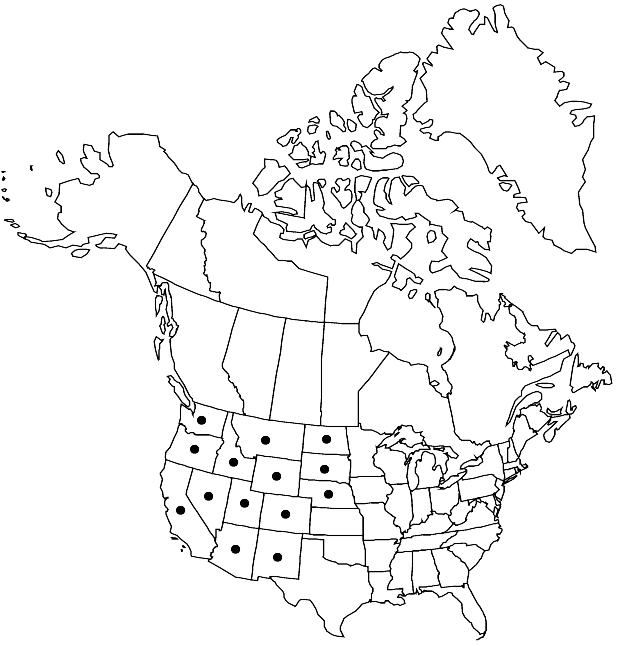Thelypodium integrifolium
in W. G. Walpers, Repert. Bot. Syst. 1: 172. 1842.
Biennials; somewhat glaucous throughout, glabrous. Stems paniculately branched distally, (2–) 4.5–17 (–28) dm. Basal leaves: petiole (0.5–) 1.2–10 (–15) cm; blade usually oblong to lanceolate, or oblanceolate to spatulate, rarely ovate or obovate, (3.7–) 5–31 (–54) cm × (12–) 16–78 (–140) mm, margins usually entire, rarely dentate or repand. Cauline leaves (ascending, not appressed to stem); sessile; blade linear to linear-lanceolate, (1–) 2.2–8.3 (–19.5) cm × (2–) 3–11 (–25) mm, (base cuneate to attenuate, not auriculate), margins entire. Racemes dense, slightly or considerably elongated in fruit, (flower buds narrowly oblong). Fruiting pedicels usually horizontal to divaricate, rarely ascending or reflexed, usually straight, rarely incurved, slender or stout, (2–) 3–9 (–13) mm, often strongly flattened, rarely not flattened at base. Flowers: sepals erect, linear to linear-oblong, (3–) 3.5–5.5 (–7.5) × (0.5–) 0.8–1 (–1.5) mm; petals white or lavender to purple, spatulate to oblanceolate, (4.5–) 6–9 (–13) × (0.5–) 0.8–1.5 (–2.3) mm, margins not crisped, claw differentiated from blade, [slender, (2–) 3–4.5 (–7) mm, narrowest at base]; nectar glands lateral, flat or toothlike, median glands absent; filaments subequal to slightly tetradynamous, (3–) 4.5–7.5 (–12.5) mm; anthers exserted, linear to narrowly oblong, (1–) 1.5–2.5 (–4.5) mm, not circinately coiled; gynophore 0.5–2 (–5.5) mm. Fruits usually horizontal to divaricate-ascending, or ascending, rarely reflexed, usually torulose, rarely submoniliform, usually strongly incurved, sometimes straight, rarely arcuate, terete, (0.8–) 1.4–6.5 (–8) cm × 1–1.3 (–2) mm; ovules 14–40 per ovary; style usually cylindrical, rarely subclavate, 0.5–1.3 (–3.2) mm. Seeds (1–) 1.2–2 (–2.3) × 0.7–1 (–1.3) mm.
Distribution

Ariz., Calif., Colo., Idaho, Mont., N.Dak., N.Mex., Nebr., Nev., Oreg., S.Dak., Utah, Wash., Wyo.
Discussion
Subspecies 5 (5 in the flora).
Selected References
None.
Lower Taxa
Key
| 1 | Petals white; fruiting pedicels whitish, stout, (5-) 6-11(-13) mm | > 2 |
| 1 | Petals usually lavender to purple, rarely white; fruiting pedicels not whitish, slender and 2-10 (-13) mm, or stout and 2-5(-6) mm | > 3 |
| 2 | Petals (5-)6-9(-10) mm; fruiting pedicels horizontal to divaricate, (5-)6-9(-13) mm; fruits (1.4-)1.9-3.7(-4.5) cm; gynophores (0.5-)1-3 mm; se California, s Nevada, sw Utah. | Thelypodium integrifolium subsp. affine |
| 2 | Petals (7.5-)8-11(-13) mm; fruiting pedicels usually horizontal to reflexed, rarely divaricate, (6-)7-11(-13) mm; fruits (2.2-) 3.5-6.5(-8) cm; gynophores (1-)1.5-4 (-5.5) mm; Grand Canyon, Colorado River, Arizona. | Thelypodium integrifolium subsp. longicarpum |
| 3 | Fruiting pedicels often slender, sometimes stout, not or slightly flattened at base, (4-)6- 10 (-13) mm. | Thelypodium integrifolium subsp. integrifolium |
| 3 | Fruiting pedicels stout, strongly flattened at base, 2-5(-6) mm | > 4 |
| 4 | Racemes often strongly congested, central rachises (0.6-)1.2-7(-9) cm; gynophores stout, 0.5-1(-3) mm; e California, Nevada, s Oregon, nw Utah. | Thelypodium integrifolium subsp. complanatum |
| 4 | Racemes somewhat congested, central rachises (3-)8-20(-28) cm; gynophores slender, (0.5-)0.8-3(-4) mm; ne Arizona, w Colorado, nw New Mexico, e Utah. | Thelypodium integrifolium subsp. gracilipes |
"elongated" is not a number."thick" is not a number."dm" is not declared as a valid unit of measurement for this property."dm" is not declared as a valid unit of measurement for this property.